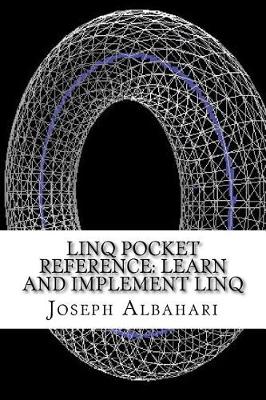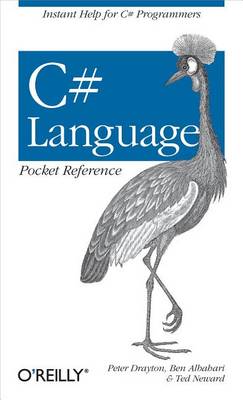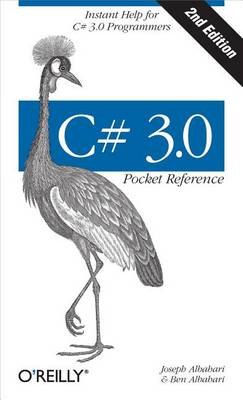Pocket Reference (O'Reilly)
3 total works
Ready to take advantage of LINQ with C# 3.0? This guide has the detail you need to grasp Microsoft's new querying technology, and concise explanations to help you learn it quickly. And once you begin to apply LINQ, the book serves as an on-the-job reference when you need immediate reminders. All the examples in the "LINQ Pocket Reference" are preloaded into LINQPad, the highly praised utility that lets you work with LINQ interactively. Created by the authors and free to download, LINQPad will not only help you learn LINQ, it will have you thinking in LINQ.This reference explains: LINQ's key concepts, such as deferred execution, iterator chaining, and type inference in lambda expressions; the differences between local and interpreted queries; C# 3.0
's query syntax in detail-including multiple generators, joining, grouping, query continuations, and more; Query syntax versus lambda syntax, and mixed syntax queries; composition and projection strategies for complex queries; all of LINQ's 40-plus query operators; how to write efficient LINQ to SQL queries; how to build expression trees from scratch; and, all of LINQ to XML's types and their advanced use LINQ promises to be the locus of a thriving ecosystem for many years to come. This small book gives you a huge head start.'The authors built a tool (LINQPad) that lets you experiment with LINQ interactively in a way that the designers of LINQ themselves don't support, and the tool has all kinds of wonderful features that LINQ, SQL and Regular Expression programmers alike will want to use regularly long after they've read the book' - Chris Sells, Connected Systems Program Manager, Microsoft.
's query syntax in detail-including multiple generators, joining, grouping, query continuations, and more; Query syntax versus lambda syntax, and mixed syntax queries; composition and projection strategies for complex queries; all of LINQ's 40-plus query operators; how to write efficient LINQ to SQL queries; how to build expression trees from scratch; and, all of LINQ to XML's types and their advanced use LINQ promises to be the locus of a thriving ecosystem for many years to come. This small book gives you a huge head start.'The authors built a tool (LINQPad) that lets you experiment with LINQ interactively in a way that the designers of LINQ themselves don't support, and the tool has all kinds of wonderful features that LINQ, SQL and Regular Expression programmers alike will want to use regularly long after they've read the book' - Chris Sells, Connected Systems Program Manager, Microsoft.
C# Language Pocket Reference
by Peter Drayton, Ben Albahari, and Ted Neward
Published 1 January 2002
This volume offers the convenience of a quick reference in a format that will actually fit in your pocket. The book includes a guide to C# language elements, a brief overview of the Framework Class library, a cross-reference for namespaces and assemblies, a list of compiler syntax and switches, and a regular expressions reference guide. O'Reilly's Pocket References provide details in a concise, well-organized format, these handy books aim to deliver just what you need to complete the task at hand. When you've reached a sticking point in your work and need to get to a solution quickly, the new C# Language Pocket Reference is the book you'll want to have.
This updated version covers Microsoft's recently released C# 3.0, including sections on LINQ. This is a book for busy people who need a succinct reference to the C# language and can be used both to learn the concepts and as a daily reference. For example, you could consult this book to learn how events work, but then also consult the book to brush up on how to write the standard event pattern. If a programmer has two days before a job interview to understand C# 3.0, then this book is an ideal choice.


